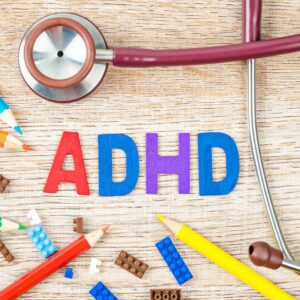
31 Aug What is the Adult ADHD Self-Report Scale (ASRS)?
WHAT IS THE ADULT ADHD SELF-REPORT SCALE (ASRS)?

The Adult ADHD Self-Report Scale (ASRS) is a standardized self-report questionnaire designed to assess symptoms of attention deficit hyperactivity disorder (ADHD) in adults. The Diagnostic and Statistical Manual of Mental Disorders, Fifth Edition (DSM-5)’s diagnostic criteria for ADHD was the foundation for the ASRS, created by the World Health Organization (WHO).
How Does the Adult ADHD Self-Report Scale (ASRS) Work?
The ASRS consists of 18 questions, and there are two versions of the questionnaire: the ASRS Symptom Checklist and the ASRS Screener. The ASRS Symptom Checklist is the longer version of the questionnaire and assesses both inattention and hyperactivity-impulsivity symptoms of ADHD. The ASRS Screener is the shorter version and assesses the six most common symptoms of ADHD.
Both versions of the questionnaire ask individuals to rate the frequency and severity of their symptoms on a scale from 0 to 4, where 0 indicates “never” and 4 means “very often.” The questions are designed to assess the core symptoms of ADHD, including inattention, hyperactivity, and impulsivity.
After completing the questionnaire, healthcare providers can score the results and interpret the individual’s signs. If individual scores above a certain threshold, this may indicate that they have ADHD, and further evaluation may be necessary.
What are the Advantages of Using the Adult ADHD Self-Report Scale (ASRS)?
The Adult ADHD Self-Report Scale (ASRS) is a valuable tool with several advantages in clinical practice. Here are some benefits of using the ASRS:
- Efficient and easy to use
The ASRS self-report questionnaire is easy to administer and can be completed quickly. It can be used in various settings, including mental health clinics. The short form of the ASRS only takes a few minutes to complete, making it an efficient tool for screening large populations for ADHD symptoms.
- The objective measure of symptoms
The ASRS provides an objective measure of ADHD symptoms. It is a standardized questionnaire that assesses the presence and severity of symptoms associated with ADHD. This means that individuals can consistently complete the questionnaire, and healthcare providers can compare results across individuals.

- Can be completed by the individual or informant
The individual can complete the ASRS, but it can also be achieved by a partner, family member, or friend who knows the individual well. This can be helpful in cases where the individual may not be aware of their symptoms or have difficulty accurately reporting them. An informant’s report can provide additional information about the individual’s symptoms and help guide the diagnostic process.
- Screening for comorbidities
The ASRS can also screen for comorbidities or other co-occurring conditions with ADHD. These may include anxiety, depression, and substance use disorders. The ASRS can identify symptoms of these comorbidities, which can help healthcare providers develop a more comprehensive treatment plan.
- Useful in treatment planning.
The ASRS can also be used in treatment planning for individuals with ADHD. It can help healthcare providers develop a personalized treatment plan that addresses the individual’s specific symptoms and areas of impairment. For example, the ASRS can identify inattention symptoms that may affect the individual’s ability to focus at work or school. Healthcare providers can then work with individuals to develop strategies to improve their attention and productivity.
- Can track treatment progress.
The ASRS can also track treatment progress over time. Healthcare providers can administer the questionnaire at regular intervals, such as every three to six months, to monitor changes in symptoms and adjust treatment plans as needed. This can help ensure that the individual receives the most effective treatment for their symptoms.
How Is The ASRS Used In Practice?
The Adult ADHD Self-Report Scale (ASRS) is a valuable tool used in clinical practice to screen for ADHD symptoms in adults. It is often used as a first step in the diagnostic process and can help identify individuals who may benefit from further evaluation by a qualified healthcare provider. Here are some ways that the ASRS is used in practice:
- Screening for ADHD symptoms
The ASRS is frequently used as a screening tool to identify those who may be at risk of ADHD. The questionnaire is intended to be filled out by the individual, but it can also be achieved by a partner, family member, or friend who knows the individual well.
The ASRS has two versions: a 6-item short form and an 18-item long form. The short form is often used in primary care settings and can quickly identify individuals needing further evaluation. The long form is used in more comprehensive evaluations and can provide a more detailed assessment of the individual’s symptoms.
The ASRS can screen for ADHD symptoms in various settings, including primary care, mental health clinics, and educational backgrounds. It is frequently used with other diagnostic methods, such as clinical interviews and cognitive tests, to assess the patient’s symptoms more thoroughly.
- Monitoring treatment progress
The ASRS can also monitor treatment progress in individuals with ADHD. It can help healthcare providers track changes in symptoms over time and assess the effectiveness of treatment interventions. The ASRS can be administered at regular intervals, such as every three to six months, to monitor treatment progress and adjust treatment plans as needed.
The ASRS can also be used to monitor the side effects of ADHD medications. ADHD medications might cause negative effects such as sleeplessness, irritability, and loss of appetite. The ASRS can monitor these side effects and help healthcare providers adjust medication dosages or switch medications if necessary.
- Improving patient communication
The ASRS can be useful for improving communication between healthcare providers and their patients. It can help individuals with ADHD better understand their symptoms and provide healthcare providers with valuable information about their experiences. By completing the ASRS, individuals with ADHD can provide healthcare providers with a complete picture of their symptoms, which can help guide the diagnostic process and treatment planning.
The ASRS can also help healthcare providers identify areas of impairment affecting the individual’s daily functioning. For example, the ASRS can identify symptoms of impulsivity that may be contributing to poor decision-making or difficulty with time management. Healthcare providers can then work with the individual to develop strategies to address these areas of impairment and improve their overall functioning.
- Limitations of the ASRS
While the Adult ADHD Self-Report Scale (ASRS) is a valuable tool for screening and monitoring ADHD symptoms in adults, it should not be relied upon as the sole method of diagnosing adult ADHD. It’s crucial to seek medical advice from a professional with expertise in diagnosing and treating people with ADHD, such as a psychiatrist or psychologist.

The ASRS is designed as a screening tool to identify individuals who may be at risk for ADHD. It is not a diagnostic tool in and of itself. Rather, it is used to gather information about an individual’s symptoms and to determine if further evaluation is necessary. A diagnosis of ADHD requires a comprehensive review that considers the individual’s medical history, symptoms, and other factors.
There are several reasons why the ASRS should not be used to diagnose adult ADHD without the advice of a healthcare provider.
- First, ADHD symptoms can be caused by other medical conditions or mental health disorders, such as depression or anxiety. A healthcare professional might complete an assessment to exclude any further probable causes of the patient’s symptoms.
- Second, ADHD symptoms can vary in severity and presentation from person to person. The ASRS is a self-report questionnaire that relies on the individual’s subjective assessment of their symptoms. While this can be useful for gathering information about an individual’s symptoms, it may not provide a complete picture of their ADHD symptoms.
- Third, the ASRS is just one tool healthcare providers can use to diagnose and monitor ADHD in adults. Clinical interviews and cognitive exams are two other diagnostic methods, may also gather additional information about an individual’s symptoms and rule out other potential causes.
- Finally, it is important to remember that a diagnosis of ADHD requires a comprehensive evaluation that considers the individual’s medical history, symptoms, and other factors. A qualified healthcare provider can conduct this evaluation and provide a diagnosis based on their professional judgment and expertise.
In conclusion, although the Adult ADHD Self-Report Scale (ASRS) might be a helpful tool for identifying and tracking ADHD symptoms in adults, it shouldn’t be used as the only way to make the diagnosis. It is a brief, self-administered questionnaire that is straightforward to complete. The Adult Screening Rating Scale (ASRS) has been approved as a viable screening instrument for adult ADHD, and it may be used to track treatment efficacy over time. A skilled healthcare professional with experience in identifying and treating adult ADHD is required for a thorough assessment to determine whether someone has ADHD. To get an accurate diagnosis and a treatment plan, it’s crucial to seek the advice of a licensed healthcare professional if you think you or a loved one may have ADHD.
Check Our Our Other Blogs:
Craig Selinger
Latest posts by Craig Selinger (see all)
- Psychotherapy and Support Services at Cope With School NYC - April 12, 2024
- NYC Parents of Teens Support Group - April 8, 2024
- Here I Am, I Am Me: An Illustrated Guide to Mental Health - April 4, 2024


No Comments